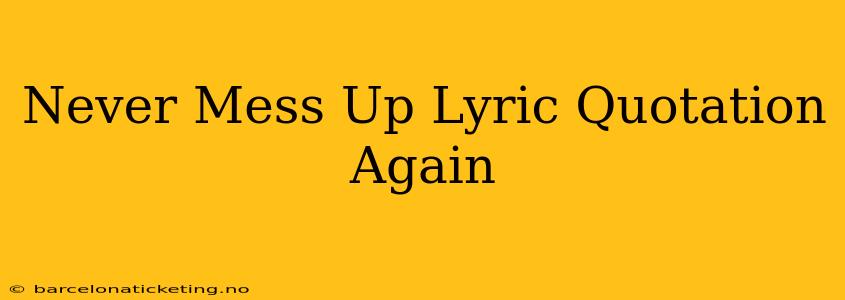Quoting song lyrics correctly is crucial, whether you're writing a blog post, academic paper, or simply sharing your favorite lines on social media. Getting it wrong can undermine your credibility and distract from your message. This guide will equip you with the tools to flawlessly integrate song lyrics into your work.
Why Accurate Lyric Quotation Matters
Accurate lyric quotation demonstrates respect for the artist's work and avoids misrepresentation. A single misplaced word can alter the meaning entirely, leading to confusion or even offense. Furthermore, proper citation shows you've done your research and are presenting information responsibly. This boosts your credibility and enhances the overall quality of your writing.
How to Quote Lyrics Correctly
Quoting song lyrics involves more than just copying and pasting. Here's a step-by-step guide:
-
Find a Reliable Source: Don't rely on user-submitted lyrics websites. Look for official lyric sites provided by the artist's label or reputable lyric databases like Genius. These sources are generally more accurate.
-
Use Quotation Marks: Always enclose song lyrics in quotation marks (" "). This clearly distinguishes the lyrics from your own writing.
-
Proper Punctuation: Maintain the original punctuation of the lyrics. Don't change commas, periods, or other punctuation marks unless absolutely necessary for grammatical clarity within your larger sentence structure. If you need to alter punctuation, indicate this with square brackets [ ]. For example: "She's got a smile that it seems to me reminds me of childhood memories [.]"
-
Ellipses for Omissions: If you omit words or lines from a lyric, use ellipses (...) to indicate the omission. For example: "The rain is falling down...and I'm all alone."
-
Brackets for Alterations: If you need to add words for clarity or grammatical integration, place them within square brackets [ ]. For example: "I'll be [there] for you."
-
Citation: Always cite the song, artist, and album (or relevant source). This is crucial for academic purposes and is generally good practice. A simple parenthetical citation after the quote is often sufficient: ("Bohemian Rhapsody," Queen, A Night at the Opera).
Common Mistakes to Avoid
-
Incorrect Lyrics: The most common mistake! Always double-check your source to ensure accuracy.
-
Missing Quotation Marks: This can lead to confusion about what is a direct quote and what is your own writing.
-
Incorrect Punctuation: Altering the original punctuation changes the nuance and feel of the lyrics.
-
Poor Integration: Don't just drop lyrics into your writing. Seamlessly integrate them into your sentences and paragraphs for a smooth reading experience.
How to Effectively Use Song Lyrics in Your Writing
Beyond accuracy, consider how you utilize lyrics. Don't just quote for the sake of quoting. Choose lyrics that effectively support your point and enhance your argument or narrative. Analyze the lyrics and explain their significance in the context of your work.
How can I properly cite song lyrics in an essay?
Proper citation of song lyrics in an essay depends on your chosen citation style (MLA, APA, Chicago, etc.). Generally, you'll need to include the artist's name, song title, album title (if applicable), record label, and year of release. Specific formatting varies by style guide, so consult your style manual for precise instructions.
What are some good ways to use song lyrics in creative writing?
In creative writing, song lyrics can be used to create atmosphere, reveal character, or move the narrative forward. You can use them as epigraphs, weave them into dialogue, or subtly incorporate their themes and imagery into your descriptions.
Where can I find accurate song lyrics?
The most reliable sources for accurate song lyrics are official websites of artists or record labels, reputable lyric websites with community verification processes, and printed lyric books accompanying official albums or releases.
By following these guidelines, you can confidently and accurately integrate song lyrics into your writing, showcasing your attention to detail and enhancing the impact of your work. Remember, accuracy and proper citation are key to avoiding any lyric-related mishaps.

